» Go to news main
Grad Profiles: Stepping forward while looking back
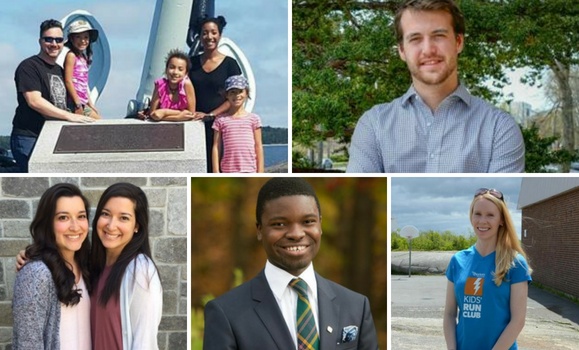
2018 represents a year of celebration for the Faculty of Medicine. This year, Dalhousie’s Medical School’s celebrates 150 years alongside Dalhousie’s bicentennial. This time of year brings further celebrations that recognize the efforts and accomplishments of our graduating Class of 2018.
That’s right, it’s convocation time.
Convocation is a special time of year at Dalhousie — the culmination of so many journeys and experiences, a celebration of both time spent on campus and exciting new chapters set to begin.
This Spring, 110 of Dalhousie’s medical students will walk across the stage of the Rebecca Cohn theatre on Monday to accept their MDs. Here are the stories of just a few of them.
Advocacy for students, global health and sustainable healthcare
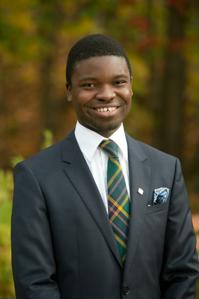 Henry Annan clearly remembers when he first decided he wanted to be a doctor.
Henry Annan clearly remembers when he first decided he wanted to be a doctor.
“Growing up, one of our closest family friends was a physician and I aspired to be like him some day,” Henry recalls. “I was very young—about three or so – and when I was asked, ‘What do you want to be when you grow up?’ I remembered there was something called a ‘doctor’ and I wanted to find out more about it.”
Henry, who one of six African Nova Scotian medical students to graduate from Dalhousie’s MD program this month, believes diversity and representation in medicine is important.
“I think my path to medicine speaks to the importance of representation in the field, so that young people can consider medicine as a potential career path.”
Representation and advocacy are close to Henry’s heart. They’re reasons why he became involved in the Canadian Federation of Medical Students (CFMS) which represents Canadian medical students on the public stage at the provincial, federal and international levels. He started volunteering with the CFMS during his first year of medical school, as Dalhousie’s global health representative for the organization. The work Henry did with the CFMS included advocating for refugee health, universal healthcare and solutions to the national opioid crisis.
Now, four years later and the outgoing president of the CFMS, Henry’s passion for the work CFMS is doing is still going strong. “What first impressed me about the CFMS, and continues to inspire me in my role as President, is that the organization represents why I entered medicine in the first place. As members of the medical community, medical students are able to use their skills, interests and knowledge to advocate on behalf of their patients and effect change that benefits the entire Canadian population.”
Henry believes that physicians can play unique roles in society outside of a hospital or clinic as advocates for better health and health systems and as policy experts. As “the front-line of health care delivery, we [physicians] are critical to informing sound health policy,” he says.
Those beliefs have piqued his interested in paediatrics, where he believes he can make a difference early on in a child’s life.
“Early childhood development is one of the major social determinants of health. We know that the positive impact a paediatrician can make in a child’s life will have implications that will last a lifetime.”
Making medicine a family affair
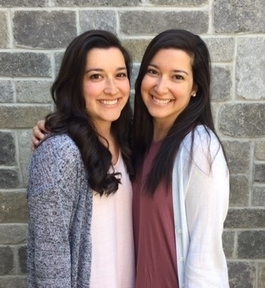 Devin and Taylor Betsch were interested in medical sciences from an early age. Devin, twin sister to Taylor, recalls wanting to be an Ophthalmologist as early as the fourth grade. Although she admits, “that was likely because it was a big word and I could draw eyeballs inside of all the letter ‘o’s’.”
Devin and Taylor Betsch were interested in medical sciences from an early age. Devin, twin sister to Taylor, recalls wanting to be an Ophthalmologist as early as the fourth grade. Although she admits, “that was likely because it was a big word and I could draw eyeballs inside of all the letter ‘o’s’.”
Born in Windsor, Ontario, Devin and Taylor moved to New Brunswick 15 years ago with their family and were happy to attend the Dalhousie Medicine New Brunswick (DMNB) campus in Saint John to earn their medical degrees. They agree that their years spent at DMNB have each been unique undergraduate medical experiences.
“Having fewer learners at hospitals throughout New Brunswick allowed us to work closely with staff members and exercise a significant amount of autonomy during our clinical rotations,” said Taylor.
The small class sizes at DMNB have allowed classmates to become close friends over the last four years. Whether they gathered to celebrate birthdays or ate meals together while on call at the hospital, they agree that they have been lucky to be members of such a phenomenal class.
However, the twins admit there was some confusion at first. “Being twins in the same medical school class over the last four years has been a joy for us and extremely confusing for everyone else!” exclaims Devin. “While the small class size was hugely beneficial for us as students, it did nothing to ease the confusion of the two of us working in the same hospital,” added Taylor.
Devin’s love of ophthalmology from childhood has carried over into her medical school experience as she was matched with Ophthalmology at Dalhousie for her residency. The combination of getting to know patients on a personal level and keeping up her hands-on procedural skills is something that excites her about the field. Vision is “precious to people,” says Devin, “so to be able to help improve or stabilize someone’s eyesight would truly be a privilege.”
Taylor was also matched to Dalhousie’s residency program, where she is focusing on Family Medicine. “Having the opportunity to interact with patients and cultivate meaningful relationships is something that I’ve valued immensely during my medical training,” she said. Taylor is excited to be able to mould her practice to address the needs of the community she lives in.
The twin doctors are excited to be continuing their education at Dalhousie, and both look forward to a future of practicing medicine in the Maritimes, a place they both call home.
Working to improve cancer detection
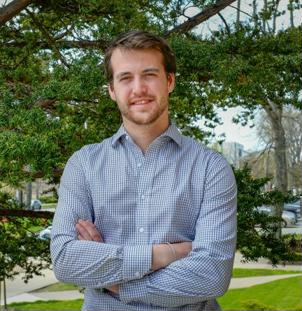 Graduating with a Master’s degree is no small feat, but as soon as you relax into the warmth of handing in your thesis, you’re faced with the biggest question of all: What’s next?
Graduating with a Master’s degree is no small feat, but as soon as you relax into the warmth of handing in your thesis, you’re faced with the biggest question of all: What’s next?
That question loomed large for Dal graduate student Matthew Jalink. Until last month, that is, when he found out he had been selected to receive one of ten International Youth Fellowships awarded in Canada this year by the Aga Khan Foundation.
The eight-month fellowship matches successful applicants with an NGO or community partner outside Canada.
“I was euphoric. That might sound a little dramatic but it was pretty exciting because I wasn’t sure of my next step after defending my thesis and graduating,” says Jalink.
His thesis—supervised by Dr. Joanne Langley, an infectious disease specialist in the Departments of Pediatrics and Community Health & Epidemiology—examined whether RSV infections in infants lead to asthma in later life. Like many graduate students, Jalink changed courses during his studies, but the core study of infectious diseases remained a constant interest.
“I think of health as a universal right and it has roots in many other aspects of development and economics,” he says. “I wanted to get involved with global health because it combines two of my passions: health and the concept of an international community. I've always enjoyed travelling and learning about other cultures.”
The Aga Khan Foundation Canada is a close fit with Jalink’s worldview. The international NGO was founded in 1967 with the mission of partnering with nations in the developed world in order to promote strong, healthy and inclusive communities in developing nations across Africa and Asia. The Canadian branch of the foundation has worked with more than 500 young Canadians through the International Youth Fellowship program since it was launched in 1989.
“I know the fellowship opens a lot of doors as far as the actual work you’re doing,” says Jalink. Not only is it a prestigious fellowship, but as he notes, “the people who receive the fellowship are good people to network with.”
Jalink was encouraged to apply for the Aga Khan fellowship by Shawna O’Hearn, director of Dalhousie’s Global Health Office and an alumnus of the fellowship herself, who believes it represents a major opportunity for which Jalink is ready.
“We are tremendously proud of Matt for being accepted into this prestigious fellowship. He is the type of person who thrives in challenging environments and this will give him an opportunity to effect change while continuing to learn with an international team,” says O’Hearn. “His receipt of this fellowship is also a signal that studies in epidemiology are about more than producing professionals for the health care workforce. It is also about producing the leaders and scientists who will contribute to transforming health care systems.”
Once he officially graduates, Jalink will head to Ottawa for three weeks of training to prepare him for his fellowship. He has been matched to the Aga Khan Hospital in Dar es Salaam, the largest city in Tanzania. He will spend seven months there as a project officer developing a plan to bring down cancer mortality rates through early detection.
Cancer rates in Africa are one third what they are in North America, but mortality is the same. Part of the reason for this is that 80 per cent of cancers on the continent are not diagnosed until they have reached an advanced stage. In Tanzania, there are only two cancer centres that serve a population of 40 million people.
“It’s still within the realm of what I studied but it’s definitely different,” says Jalink. “It will be great to learn more and apply the skills that I’ve learned at Dalhousie in a workplace scenario.”
Most students on international placements face the challenge of adapting to a new place and a new culture on top of mastering their new role. But Jalink has already worked in Tanzania. Twice. First as a research and health care assistant in a maternal health clinic in Moshi, and most recently in 2016 as the recipient of the Queen Elizabeth II Diamond Jubilee Scholarship. The international elective sponsored by that scholarship put him in Dar es Salaam for four months, where he worked with one of Dalhousie’s Global Health Office partner organizations, Pastoral Activities and Services for people with AIDS Dar es Salaam Archdiocese (PASADA).
“Even though I’d hoped I’d be back, I never quite expected that it would happen, especially this soon,” marvels Jalink. “I became familiar with the city and the culture and made a number of Tanzanian friends including some expat friends that I’m still in regular contact with. I even managed to pick up a fair amount of Swahili. I was always hoping that I could make it back there someday in a more professional capacity and I lucked out.”
Mother of three pursues a second career in medicine
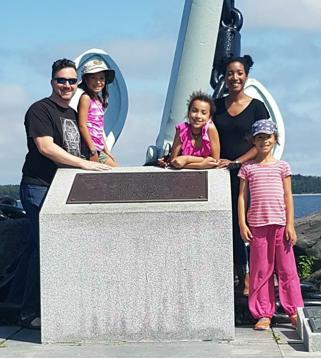 When Johneen Manning decided to go to medical school, she already had three daughters under the age of four. Not surprisingly, she was often asked, “How will you do it?”
When Johneen Manning decided to go to medical school, she already had three daughters under the age of four. Not surprisingly, she was often asked, “How will you do it?”
“I studied during my ‘night shift’ after my children had gone to sleep, and in waiting areas outside my daughters’ dance classes,” she says. “I could not have made here without the enormous coordinated effort from my partner, our families, and the generosity of my children. All of whom prioritized my need to study and be away for rotations or electives.”
While working towards a career in family medicine, Johneen’s personal experience as a parent and her untraditional path to medicine serves as an inspiration to achieve her goals. She came to Dalhousie Medical School with two degrees (biology and architecture) and a decade-long career in design and communication. After having children and talking to doctors and nurses in the community dance class she teaches, she began to wonder if a career in the health professions might be more fulfilling.
She decided to volunteer one morning a week at the Halifax Sexual Health Centre to see if medicine was right for her. “Witnessing the important care and support the centre provided to women and men from across the province sold me on this path,” she says.
After graduating this spring, Johneen will pursue residency training in family medicine at the University of Ottawa. Her goal is to practice family medicine in a community setting. She is particularly interested in learning more about health issues and social determinants of health specific to women.
“Since women make up more than half of the population and are often at the hearts of families and communities—caring for children and elders and playing an essential role in the economy, both visible and invisible—I believe that providing better care, support, and advocacy for the health and social rights of women and girls enhances the wellbeing of our society as a whole,” she says. “It's a win-win.”
While at Dalhousie Medical School, Johneen participated in the Research in Medicine program, where she explored the needs of women who breastfeed in the workplace — particularly women who breastfeed during their studies at Dalhousie. She was the catalyst in bringing together a group of at Dalhousie that included expertise in lactation, Human Rights & Equity Services, Human Resources and student accommodations. The group developed guidelines to help the university support faculty, staff and students to breastfeed on campus, including recommendations for accommodations and infrastructure to make breastfeeding easier and more comfortable.
Johneen hopes that as a family physician, she will play a role in building more supportive communities for the better health of all.
Learning Health On and Off Campus
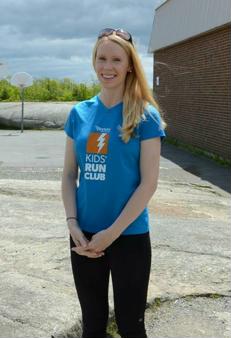 While on maternity leave between second and third year of medical school, Allison Spurr realized the importance of empathy in her studies and future medical practice.
While on maternity leave between second and third year of medical school, Allison Spurr realized the importance of empathy in her studies and future medical practice.
She made this realization through her volunteer time with Roots of Empathy, which develops empathy and emotional literacy in children from kindergarten to grade eight by bringing babies and their mothers into the classroom. Allison was so inspired by the children she met that she wanted to find a way to keep volunteering with them.
“These were great kids who were so keen and I had the time to volunteer,” Allison recalls, “I was looking for low-cost, high-impact programs to engage these kids in physical activity.”
That is when Allison became involved in Kids’ Run Club. Run by Doctors Nova Scotia, the program is a no-cost province-wide initiative to address inactivity in children and youth. Allison recruited 15 medical student volunteers to run programs at three low-income schools. The non-competitive running program is designed to be fun and educational, teaching participants the importance of healthy living and physical activity.
“Because the program is free and school-based, we get to provide kids who might not otherwise have an opportunity to participate in organized sports and activities with a chance to be part of a club, improve their fitness and confidence in being active,” explains Kids’ Run Club program coordinator, Kerry Copeland.
Now in her third year coaching Kids’ Run Clubs across Halifax, Allison says she has seen a huge change in the fitness levels of kids who have come out to the club, noting that, “some kids who weren’t able to run a whole city block can now run an entire 20 minutes, plus.”
But the benefits didn’t stop there.
Allison says teachers have noticed that the kids who participated in the run club were able to focus in class more. “I also saw several kids come out of their shells and gain confidence in their interactions with coaches and teammates over the weeks of the program.”
After convocation, Allison is moving to Ottawa with her family, where she was matched with a dermatology residency. Thanks to her efforts, Dalhousie medical students will continue to work with Kids’ Run Club. There are currently 15 medical students who are trained and supporting six different Kids’ Run Clubs around Halifax and will continue to go the distance.
Photo credits to Jollymore Photos and Marnie Gills, Doctors Nova Scotia
Recent News
- New global study Highlights the Biological Roots of Anxiety
- Dalhousie and NCIME launch first‑of‑its‑kind program in Membertou First Nation
- A message from Wanda M. Costen, PhD, Provost and Vice President Academic
- Rhodes scholar Sierra Sparks returns home to study medicine
- President Kim Brooks, Dr. Pat Croskerry appointed to Order of Canada
- Dal’s Highly Cited Researchers reflect on influential global research alliances
- A New Bursary Supporting Black Medical Students at Dalhousie
- Dalhousie’s first physician assistant cohort steps into Nova Scotia’s healthcare system
